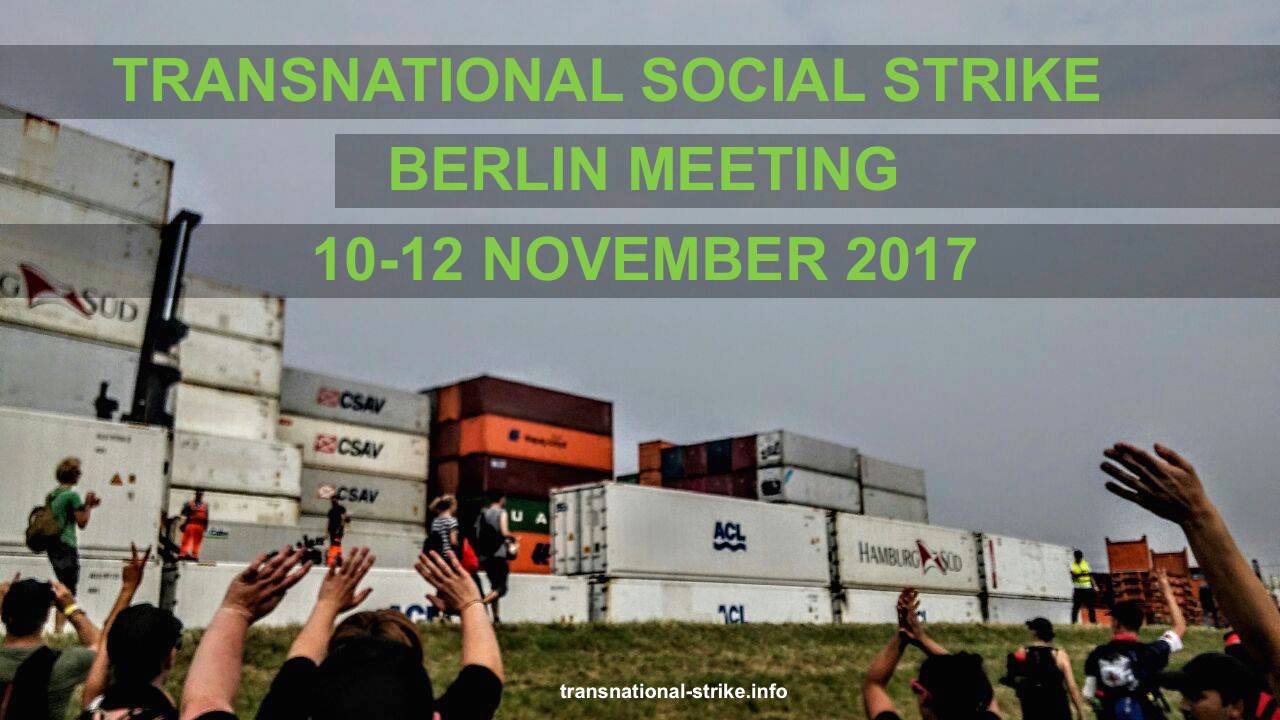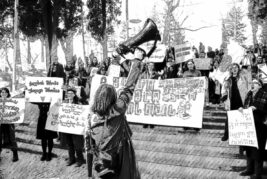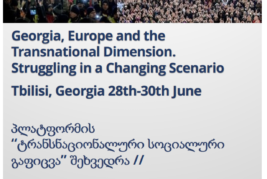
Registration
We’re trying our best to put together the best weekend we can and to do that we need some info from you. Please fill in the registration form that you find at this link: https://goo.gl/a5cS4R
Please submit the registration form by the 8th of November at midnight, the latest.
Call out
Programme and workshops
Friday 10th November
16:00 TSS Platform Coordination Meeting (Wildenbruchstraße 24)
19:30 Welcoming (Tommy Haus, Wilhelmstraße 9)
20:00 Opening Session
*******************
Saturday 11th November (Alice-Salomon-Platz 5)
Morning:
10:00 Breakfast
10:30 – 13:00 Workshops
1) The logistic turn of repression: a society under authoritarian control
Why a workshop about repression? Because a materialistic reading of repression can help the process toward the social strike in answering in the broadest way to the challenges set by the neoliberal governance throughout Europe. Within the analysis made by the TSS platform, logistics is not only understood as a crucial sector of today’s capitalism. It rather points to the way in which social and political relationships have changed. In this framework we want to consider the authoritarian twisting we are facing on a European scale. A twisting which is active on many levels: migrant labour force flows governed by barbed wire borders or by welfare state restrictions; transformation of the welfare state itself into a debt mechanism to produce a class of working poors; reforms of strike and union laws as well as repression of worker’ strikes. Can we link these phenomena together with the militarisation of urban centres, arbitrary arrests, clearing out of occupied spaces and houses? Can we understand this twisting as a production of a state of exception in order to rule labour, migration and social processes?
We propose a discussion on three axes:
– transformation on a European scale of the criminal law in a “criminal law of the enemy”, that is, a criminalisation of all those subjects (workers, migrants etc.) who refuse to be put at work; transformation of political crime in administrative crime.
– the use of police as a subject within a permanent state of exception in a “internal colonialism” attitude.
– the govern of the metropolis, the decorum, expulsion of every kind of conflict from the urban centres to the periphery.
Apart of this we think it is important to add a discussion about concrete praxis of the “logistical strike of detention” about CIE (Centres of immigration and detention), CARA (Centres for asylum seekers) and jails and about the self-defense of communicative, relational and political confrontation channels (websites and cooperative social spaces).
2) Challenge the logistics of exploitation
The crucial role played by logistics discloses both the transnational character of todays’ capitalism and the necessity to rethink struggles on a transnational level. Hubs, warehouses, transports and infrastructures allow the functioning of production chains across borders and frontiers. While logistics pretends to make the space uniform in order to realise value and imposes working conditions and protocols on international scale, it produces fragmentation and domination over workers. A company like Amazon is an example of how this logic brings in a new quality of exploitation on a transnational scale. By implementing metrics of performativity through the use of performance indicators, dedicated softwares and remote control, Amazon deconstructs the labor process and extends pressure over each worker. Behind a smile and the glittering façade of logistics, Amazon promotes a world of smooth deliveries for customers and pretends to extend corporate values to its workers.
Nevertheless, this ‘systemic nightmare’ dreamed by logistics faces a surge of struggles: from ports to warehouses, from factories forming global supply chains to companies of the so called gig-economy. The Amazon strikes in Germany since 2013 as well as the ongoing struggles of Foodora and Deliveroo riders in Berlin are in this sense paradigmatic. They have arisen within a framework of conflicts and strikes against production regimes which involve workers throughout Europe. In these regimes where digital and algorithmic procedures of capillary control measure and evaluate every performance, work is extremely precarised and intensified, migrant labour is exploited and the transnational dimension is used as a blackmail. In Germany, Amazon is recently reacting to workers strikes opening new warehouses in order to spread its logistical chain and undermine the struggles: if workers strike, part of the production will be displaced to other Amazon centres.
What at first hand seems to be the strength of logistics reveals also its weakness, that is, the vulnerability of supplies and production to national and transnational communication, exchange and solidarity between workers. As part of the recent struggles we have seen emerging networks of struggles which aim at facing and blocking the material infrastructure of capital: the international solidarity that Amazon workers in Poland showed two years ago when they slowed down the production in occasion of a strike in Germany and the one that Foodora and Deliveroo riders have now built through their first international assembly during the G7 in Turin. Above this, the fact that also Amazon has started to employ riders for 1-hour delivery service proves that these conflicts are to be connected within the same paradigm. The faster the goods have to be transported, the more vulnerable logistics is, as also a few hours block of the port in Hamburg has shown during the G20 summit. At the same time, the experiences of the past years show both the potentiality of blocks for single struggles, and their limits in producing a stronger politicization. We learned that instead of simply mirroring logistics’ discourse and its technical equipment, a politics that aims to contrast the pervasive fragmenting power of logistics must combine the capacity to materially hit in specific points and politically attack the social and political conditions of reproduction of capital. Starting from this, we think that few critical points should be discussed considering both the general political dimension of logistics and specific experiences of struggles. How can form of grass rooted unionism be concretely organised within fragmented and precarious labour relations and which forms of logistical strike are possible? Can struggles in some logistics sectors be linked on the basis of a critic of the algorithmic organisation of labour? How can we build a transnational block of logistic?
The workshop will be devided in two sections: one general section plus a second section devoted to sharing struggle experiences, ideas and proposals for self-organization in the logistics sector and discussing how to develop tools of communication and organization to coordinate struggles transnationally. The participation of workers from Amazon, Foodora and Deliveroo is expected. The campaign “Make Amazon Pay”, which promotes actions at different Amazon locations during the Black Friday will also be presented and discussed.
3) Freedom of movement across the SmartBorder
While migrants continue to strike the borders with their feet, the EU sponsored policies have made increasingly more difficult to reach the European soil. But, even when the most visible face of EU policies are fences and bulldozers, the best weapon chosen by the governments it’s the pen. The new European border regime has indeed been built thanks to agreements and handshakes with countries like Morocco, Turkey or Libya. And still the same pen is now writing the story of thousands of Afghans who are being deported to their country. Beyond the simple appearance of an effective closure of the external borders of Europe, in this workshop we want to discuss the reconfiguration of borders as a segmentation and social stratification, and as driving forces of precarisation of labour and life. Besides the restriction of the possibility to access legal status for newly arrived migrants – including the ones in the ‘reception systems’ – and the political silencing of many other migrants who have been in Europe longer, what is being built is a smart border able to distinguish desirable crossings from undesirable crossings. The wares pass and people are kept in a dimension of suspend guarantees and limited legality. We daily attend a process that condemns the irregular migrants and criminalises volunteers. Like other practices used against intra-European borders, now rescue at sea has become a criminal act against State security.
How can the political subjectivity of migrants who self-determine and organize emerge? How to defeat the rhetoric of the danger that pushes more and more towards the securitization of migrations? Which role does the fascist movement play and how it’s connected with the governmental politics? If we approach the border, where the people play their last hope and often risk their life, which practices are to put in place to ensure freedom of movement? How can we push for a European residence permit without conditions as a tool to sustain the daily struggles of the people who are anyhow crossing the borders and moving around Europe?
13:00 – 14:30 Lunch
Afternoon:
14:30 – 17:00 Workshops
4) Precarity, self-organization, strike: connecting labor struggles on a transnational scale.
In continuity with the previous TSS, this workshop will discuss the issue of precarious labour and how to organize locally and transnationally against it. Over the last few decades, precarity has become a structural feature of the labour market, affecting an ever larger segment of the labour force. Under the call for more and more flexibility, efficiency and productivity, the European labour markets have undergone a process of precarization whose main result is to leave workers deprived from rights, security and well-being. The precarization of work and employment relationships affects also those who used to be considered as secure and socially protected. Against this background, it has become inappropriate to speak about precariousness as proper to a distinctive category or sector. This context is still more complicated because of the new models of labour market introduced by the gig and sharing economy, which are characterized by the individualization of work performance, by the absence of any protection and by a redefinition of the allocation of profit and business risk to the detriment of workers.
The surge of different struggles and strikes we have seen over the last few years – i.e. Amazon’s workers’ struggles, the protests of the logistics sector in Italy, the social strike against the ‘Loi travail’ and its world, the actions and strikes of Deliveroo’s and Foodora’s (and other) riders in Italy, Greece, Germany, Spain, and the UK, the struggles of care workers at Charitè in Berlin, Ryanair’s pilots and cabin crews’ strikes in many European countries, the struggles of migrants against the connection between exploitation in the workplaces and institutional racism, the new forms of social unionism and the experiments of mutualism and community organizing – reflects the fragmentation of the labour force and points to an insubordination which can only find always unstable and transitory forms of organization. While this instability can be seen simply as a weakness, it also reveals a general precarious working condition.
It is necessary, then, to suggest new proposals for both analysis and action. Indeed, while unions remain a central tool of struggle for the workers, extreme flexibility and mobility make it necessary to think about new tactics and instruments of organization. On the one side, workers face the need to obtain better wages and working conditions locally, while, on the other side, they are increasingly mobile and confronted with an organization of production that is organized transnationally. This creates fragmentation and competition among workers and places, raising the issue of how to connect different struggles that are often calibrated on very local situation and are thus difficult to replicate and be used by workers on the move.
During this workshop we thus want to ask what we can learn from the workers’ struggles and from experiences of new unionism of the recent years in order to understand how the TSS can help in relation to these experiments of organization. The questions are: what innovative forms of organization can be put in place to deal with the new labor market models and to overcome the fragmentation among workers? What kind of transnational labor disputing and political struggle can face the material and digital labor chains across borders? What forms of organization can connect workers which are united in precarity, but divided in status, contract or level of mobility? What tools should the TSS provide in order to contrast the logic of division and fragmentation that the European command over labor imposes? What kind of political infrastructure it should become in order to enlarge and empower these struggles, even at the local level?
5) Data mining, algorithmic profiling, cyber security and automation: How to virtualize the revolution.
Data mining, alghoritmic profiling, cyber security and automation have invested with its own pervasive force the whole society. Over the last ten years, the network has become a paradigm of production of singularities. While the ownership of data processing, information gathering, and even manufacturing processes remains firmly in the hands of Silicon Lords, more and more sectors of the economy use the Black box model to lead their corporate production. While work is atomized and privatized, almost informal through the development of “just in time” and so-called sharing economy, human relationships are standardized and quantified through interactions in social networks. An overall process that tends to human obsolescence through investment in robotics and artificial intelligence. If we add to this the non-secondary role that social media have in building political campaigns and often disarrange social relationships, the need for a workshop on what can be claims, practices, political priorities in the 4.0 world looks urgent.
The progressive robotization of work brings back on the debate the issue of universal income. The market of the data and its double face of deep extractivism and innovative form of control and manipulation calls for new forms of collective opposition and reappropriation far beyond the instrumental action of containment that some states and tribunals are lately carrying on.
Moreover the diffusion of hate speech, the tiranny of visualizations and likes, and the proliferation of the fake news, represent by one side the legitimation of the intensification of neoliberal policies and by the other its perpetual results. How can we strike against the rising of the algorithmic control and exploitation? How could the meaning of social strike include also a rupture in relational patterns which are deeply influenced by our virtual productivity? How can non-proprietary tools be used and diffused to promote self organization in the web and how can they be integrated into the development of the TSS platform? How can competences be shared and used to organize blocks of the virtual flows?
17:00 -17:30 Coffee Break
17:30-20:00
6) The global women’s strike: a feminist perspective of struggle
What has happened worldwide in the last year (from Poland to Bolivia, from Argentina to Italy, arriving to the Women’s march in the USA on the 21st of January) and what happened on the 8th of March 2017, in more than 40 countries in the globe, is the road to follow for a feminist revolution to come: a global women strike.
The strike of March 8th was transnational not only because it occurred in many countries, but also because it opposed an attack against women that crosses the national borders. What is violence against women and all oppressed genders? Gender violence is the violence of society. It means violence against our bodies and minds, but violence means also austerity measures that are cutting everywhere welfare provisions, health care, education and social help, violence is reforming the labour market towards more and more precarization, violence has many forms and we have to recognise them all to fight against them. We are now seeing a rise that embodies the oldest and most radical conflict in the social structures of the whole world: the gender conflict, which is often regarded as marginal to the class conflict, but is actually at the core of economic and social organisation under the capitalist system. It is in the body of the woman that productive and reproductive functions of capitalist exploitation come together, and it is starting from there, from our body and lives that we decide to stop the game, and strike! “If my life has no value, then produce without me!” our sisters from Argentina were shouting, and this is what we want to say today and in the future.
Thanks to its global resonance, the potential of the strike reached also those cities and countries in which it was only evoked and not practiced. Women have shown that the strike can be much more than a regulated way to negotiate specific working conditions. The strike showed the possibility to organize massively against a society which demands a total availability on women’s body, life and time, expressing a political refusal of that condition. The perspective opened up by the global women’s strike forces us to think anew the strike in its social and transnational potential.
The massive protests that saw women and all oppressed genders at the frontline last year have been able to put the feminist issue as a central one, capable to open the way for other subjects to express their refusal of exploitation and oppression. We need to ask ourselves how to continue in this direction and oppose the fact that today the capitalist system through the media and advertising increasingly attempts to coopt feminism and transform it into bare “pop” propaganda. At the same time, the New Right is attempting to bring back the division between private and public life, in order to affirm a conservative revolution, which aims at erasing the feminist conquer expressed in the sentence: the private is political. The way in which in Germany the AfD tries to turn intersectionality into a divisive and essentialist tool, for instance by using a marker such as being lesbian of its leader Alice Weidel, a corporate manager, as a shield against accusations of being homophobic and sexist, shows the contemporary alliance between neoliberalism and neoconservatorism as a way to maintain women’s subordination in the private sphere.
Dividing human life into a private and a public sphere has always been a patriarchal strategy to hide women’s subordination and exploitation. Against this, on March 8th women did not simply denounce their “feminine disadvantage”, but rather expressed the refusal of oppression and roles based on gender, pointing at the necessity of connecting the struggle against patriarchal violence with other fights, such as that against institutional racism and precarization of labor and life. How can the practice of the women’s strike bring back what is too often considered to be private, such as familiar relations, care relations, health and love, into the political sphere? What organizational challenges does the project of the women’s strike pose in a context such as the German one? How can we, starting from a gender strike, create a space in which we can share with other resistant subjectivities, a space which shall be able to include, sharpen and create bonds with other conflicts?
20:00 Public Event (K-fetish, Wildenbruchstraße 86)
Prime Life Now – Make Amazon Pay!
“Make Amazon Pay”-campaigners together with Amazon-workers and grass-unionists from Poland discuss Amazon as a target for strike-solidarity and for anticapitalist action.
Amazon as a company is a pioneer in two senses: first, it stands for a new quality of workers‘ exploitation and repression. Under what is debated as “digital taylorization” through which every worker is as much as possible isolated from the other during work, Amazon deconstructs all the labour processes and calculates as well as (digitally) supervises the “average time” needed for each task and therefore creates heavy pressure on each and every worker every day. This repression is framed by a permanent smile and the “new labour” community-simulation, that everyone is a family.
On the other hand, Amazon as a Silicon Valley-based company is a pioneer in designing a future which is shining by new technological breakthroughs – everything is digitalized, everything is automated, everything is available in a cloud and everything and everyone are connected; a big family, in real life. Amazon is a big contributor to the “individualized, smart world” – you only need to trade in your autonomy. A world with huge potential digital innovations for the good life for everyone indeed, but in that vision under capitalist accents, i.e. with the paradigm of profit accumulation and exploitation, pauperisation and total control. But we say: Another future – for both, work and life – is possible and necessary!
The campaign “Make Amazon Pay” will do actions at different Amazon locations in Europe during the week around the “Black Friday” on 24th November – an important sale-day during Amazon’s vital Christmas-business. We target Amazon for those two reasons. First, we want to support the international resistance of Amazon workers which has been taking place for years, recently finding expression in strikes at multiple locations in Germany. Second, we want to target Amazon’s future vision, which is not only concerning workers, but also consumers and users – so everyone.
Organised by TOP B3RLIN (part of “Make Amazon Pay”) and FAU Berlin
*******************
Sunday 12th November (Drugstore, Potsdamer Straße 180)
10:00 – 11:30 TSS assembly
11:30 – 12:00 Coffee break
12:00 – 14:00 Final Plenary
After 14:00 “Aufwiedersehen lunch”.
The meeting is open to everyone. Moreover if needed, there will be some time slots dedicated to self-organized meeting among workers in order to promote transnational networks for specific economic sectors (care work, food delivering, call centers…).




